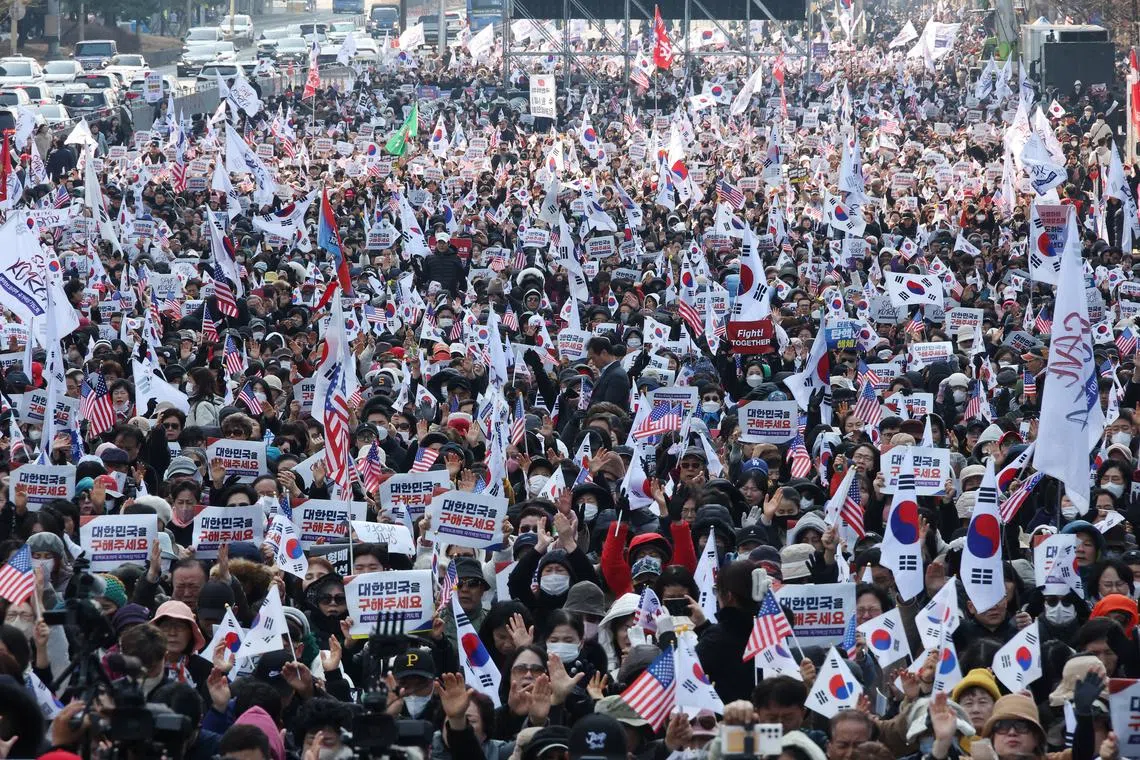South Korea’s firebrand pastors flock to impeached President’s cause
Sign up now: Get insights on Asia's fast-moving developments

Outspoken pastors and their flocks have emerged among Mr Yoon Suk Yeol's most vocal supporters.
PHOTO: REUTERS
Follow topic:
SEOUL – When South Korea’s Constitutional Court rules on President Yoon Suk Yeol’s impeachment, expected in the coming days, few will be watching more closely – or be watched more closely for possible rabble-rousing – than the country’s activist pro-Yoon churches.
Outspoken pastors and their flocks have emerged among the conservative President’s most vocal supporters, demanding in mass rallies, online videos and lawmakers’ speeches that he be restored to office after his impeachment over a martial law declaration
Invoking their religious faith and ardent anti-communism, they have doubled down on support for Mr Yoon and cast his impeachment not as the reining in of a rogue leader, but as an existential threat to the fight against North Korea and other enemies.
Critics from other religious and political groups, meanwhile, see the churches’ strident rhetoric also as a ploy for attention and influence, amid a wider struggle with rising secularism and shrinking congregations.
“This shows they want to exercise power and demonstrate that they are still influential in South Korean society,” said Dr Sukwhan Sung, a theology professor who heads the Centre for City and Community, a Seoul-based research organisation.
The rallies and agitating have helped to power a comeback by Mr Yoon’s party in the court of public opinion.
Polling shows they now lag the opposition by just 4 percentage points, compared with a 24-point deficit in December, according to Gallup Korea.
Leading this anti-impeachment charge is Save Korea, a religious advocacy group set up in the wake of Mr Yoon’s martial law declaration
Thousands of supporters have attended its rallies, including one in the conservative stronghold of Daegu that police estimated drew more than 50,000 people.
“At first, everyone had doubts about martial law. But many have been enlightened thanks to Save Korea,” said Ms Bae Ji-hyun, who was attending her third Save Korea protest in Seoul on March 8.
Other attendees at the group’s “national emergency prayer meeting” carried signs saying “Yes to Martial Law” and “Stop the Steal” – the latter echoing unsubstantiated claims by both Mr Yoon and US President Donald Trump of widespread election fraud.
Lawmakers from Mr Yoon’s ruling party have also appealed to religion in their protests.
A group that gathered around the Constitutional Court last week prayed that God would move the hearts of the judges, while one told reporters that South Korea was fighting a “spiritual war against dark forces”.
Heated rhetoric
Mr Yoon’s Dec 3 martial law declaration sought to ban all political activities and ordered the media under military control, as he vowed to root out “pro-North Korea” and “anti-state” forces in the country and to end opposition gridlock.
Although the declaration was withdrawn after only six hours, it triggered large-scale anti-Yoon protests and a parliamentary vote on Dec 14 to impeach him.
Counter-protests by Mr Yoon’s supporters steadily gathered steam, especially around the time of his arrest on Jan 15, and pro-Yoon activists stormed a court in late January after it extended his detention.
He was released on March 8 and is awaiting a decision by the Constitutional Court, which will have the final word on whether he should be ousted from the presidency or restored to power.
In the meantime, heated rhetoric at gatherings of Yoon supporters has raised concerns about clashes, and police are preparing for unrest from either side when the court rules.
Evangelical preacher Jun Kwang-hoon, who heads the Sarang Jeil Church and has led pro-Yoon protests in Seoul, vowed at a rally outside the President’s residence in March to finish the job – begun by Mr Yoon’s brief martial law – of “cleansing” the country.
If the judges vote to remove Mr Yoon, Mr Jun said, “we will mobilise the people’s right to resist and blow them away with one stroke of the sword”.
The pastor is under investigation by police for suspected incitement of insurrection in connection with the January attack on the courthouse.
The church said in a statement to Reuters that his rhetoric did not carry any violent messages, while a separate statement on its website said it would comply with the police investigation.
Many Protestant churches in South Korea, like conservative churches elsewhere, have been advocating for social causes for years, including to block LGBT events and laws that would prohibit anti-LGBT discrimination.
The anti-impeachment drive takes them further into political activism as they grapple with a decline in followers.
Just four in 10 South Koreans identified as having religious faith in a 2021 Gallup Korea poll, down from 50 per cent in 2014.
Only 22 per cent of those aged 19 to 29 said they were religious, the poll said, with 14 per cent saying they were Protestants.
Some religious organisations have criticised the pro-Yoon activism, with a task force of the National Council of Churches calling Save Korea a “political group disguised with a Christian facade”.
Save Korea said the group does not support any particular political parties.
“We are focusing on prayer movements to protect evangelical values and liberal democracy, and it is a misunderstanding to interpret them through a political frame,” a spokesperson said. REUTERS

